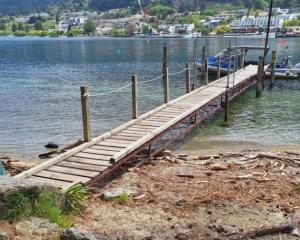Positioning a proposed purpose-built glow-worm cave within a commercial or urban Queenstown setting would turn it into a "theme park-style attraction," contradicting the resort’s unique identity and vision, one of its promoters says.
Influencers Bridget Thackwray and Topher Richwhite applied to the Queenstown Lakes District Council last year to establish and operate what is touted as New Zealand’s first sustainable glow-worm experience, "Eco-Cave". Built on a 119ha site off Gorge Rd, the land forms part of the Queenstown Adventure Park.
Located within an outstanding natural landscape (ONL), Faraway Entertainment Ltd’s application included a two-lot subdivision to enable a 7072sq m allotment to contain the proposed glow-worm cave and ancillary buildings — the balance of the land would be retained in its current state.
The applicant had volunteered a condition preventing any residential use of the site, should Eco-Cave cease to operate.
A carpark for 28 vehicles was proposed with a complimentary shuttle, running guests to and from Queenstown’s CBD during operational hours, proposed from 9am until 10pm.
The application attracted six submissions — five in opposition and one neutral — none attended yesterday’s hearing before independent commissioners Wendy Baker and Jane Sinclair in Queenstown.
Council resource consents planner Erica Walker recommended consent be refused, finding the proposal would have more than minor adverse effects.
"The primary issues in contention are the proposal’s impact on rural character, its lack of reliance on rural resources despite its location in the rural zone, and its scale, which is not anticipated within the ONL," her report said.
"Additionally, the development’s commercial nature and scale are likely to introduce adverse visual effects and contribute to the sprawl of commercial activities into the ONL environment."
In her written evidence promoting the application, Ms Thackwray told commissioners the Gorge Rd site offered exactly what the Eco-Cave required — "a natural buffer zone around the colony that minimises disturbances" — and any ambient noise could be managed within the cave.
Ms Thackwray said an urban environment could threaten the stability of glow-worm colonies and told commissioners the the proposed Eco-Cave site would make a positive contribution to Queenstown, by aligning with the area’s sustainability goals, support biodiversity restoration, and enhance its international reputation as a nature-focused destination.
"What makes Queenstown truly different is its natural environment, with unique tourist activities immersed in harmony within nature."
Also in support, landscape architect Rebecca Lucus contended the ONL values were "low" in the receiving environment, due to the changed character of the surrounding area.
Activities included the Queenstown Community Gardens, Off Road Adventures’ quad and dirt-bike tours, and the construction of an active travel trail from Arthurs Point to Queenstown, which had resulted in entries to rural properties being asphalted.
"It’s got all those other activities ... there really is no rural character there," Ms Lucus said.











